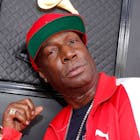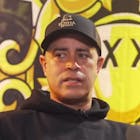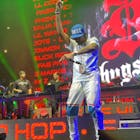
Beat Breakers: The Songs That Stopped The Party
Beat Breakers: The Songs That Stopped The Party
By Jay Quan
Published Wed, September 6, 2023 at 4:00 PM EDT
There’s an age-old adage that music soothes the savage beast, but can music actually summon that beast?
The Savage Beast
Since the inception of Rock n' Roll music, there have been accusations that it was a negative influence that caused violence. Hip-Hop culture and Rap music are no different. From the early parties that predate Rap records to Rap's Golden Age, there have been songs accused of being responsible for members of the crowd "wildin' out." Is it the actual music that causes the crowd to act out, or were those partygoers bound to shut the party down regardless?
Listen To Me
Scorpio of Grandmaster Flash & The Furious 5 spoke with Rock The Bells about early Hip-Hop parties.
"There was something about 'Listen to Me' by Baby Huey that made the stick-up kids go wild! I don’t know whether it was some frequency in the music or what, but the chain snatchers and stick-up kids went wild when that record came on!” he said.
Scorpio’s fellow Furious 5 bandmate Rahiem remembers things the same way. “It never failed! Either a fight broke out or somebody got stuck up. I don’t remember any other song consistently causing that kind of reaction.”
"Listen To Me" is a foundational breakbeat and a favorite among Hip-Hop's first generation of B-Boys and girls. "That's one of my favorite joints," says Disco Bee of Grandmaster Flash & The Furious 5. Sha Rock of the Funky 4, who got her start as a B-Girl at Kool Herc's parties, cites the song as a favorite as well. Little Terri, an early attendee of the first Hip-Hop parties and the inventor of the ever-popular Hip-Hop call and response phrase 'somebody say hooo', remembers, "there was this one song that would cause fights every time Flash played it. It was Baby Huey's 'Listen To Me'."
Ironically, "Listen To Me" has been sampled by Public Enemy, Digital Underground, Eric B & Rakim, Double Dee & Steinski, and many others with no known issues of violent reactions.
DROP YOUR EMAIL
TO STAY IN THE KNOW
The Up Rock
B-Boy Crazy Legs of the Rock Steady Crew offers a different perspective. “I don’t think it was the songs that caused the issues. From my perspective as a B-Boy and a person who was in the crowd a lot more than the M.C.’s, it wasn’t the song as much as an action that someone did that caused problems. Whether it was “It’s Just Begun”, “Apache”, or “The Mexican”, if you were Up Rocking and someone touched you, there would be a problem!” Up Rocking is a very competitive and aggressive dance where you’re close to each other, making taunting and disrespectful gestures. Some dancers take it too far and touch their competitor on purpose. When that happens, there’s going to be a problem regardless of the song that’s playing.
Legs continues, “At a club called Broadway 96 back in the day, The Rock Steady Crew and a crew called The Ballbusters from 137th & Broadway were in the place at the same time. That could have turned into a problem because Rock Steady were stick-up kids and The Ball Busters were gangsters. Rock Steady was rolling 30 deep that night, and most of us were dancers, but there were some street dudes with us and them as well. If we had gotten into a battle and someone touched someone else, it would have been two-fold because we would have wanted to hurt them dancing, but we would have wanted to hurt them physically too since we were rivals. The song that was playing wouldn’t have mattered. At the early Hip Hop parties, there were lots of stick-up kids and gangsters. If you were going to get stuck up, it was going to happen. So, if a certain song wasn’t played, would the stick-up kids not do what they do?”
Gang Records
In a Red Bull Music Academy interview about Uncle Jamm's Army, Ice-T speaks about George Clinton's gargantuan hit "Atomic Dog."
“Certain records were gang records. 'Atomic Dog' – Crips called themselves Crip Dogs, and if you put that record on, the sets would start banging. 'Aqua Boogie' and 'More Bounce' – those were gang records.”
In the same interview, The Egyptian Lover mentions that they had "emergency songs" in their crates of records that would stop the gangs from fighting. He cited “Flashlight” by Parliament as one of those records that would halt the fights and get the gangsters to dance.
Go Brooklyn
By the mid-1980s, rap songs that celebrated and represented neighborhoods (particularly the boroughs of New York City) were gaining popularity. Cutmaster D.C.’s “Brooklyn’s In the House” and M.C. Shan’s Queensbridge anthem “The Bridge” were significant records in 1985 and 1986. In 1986, Stetsasonic released “Go Stetsa I,” the first single from their Tommy Boy Records debut “On Fire.” The song quickly earned the moniker “the chain-snatching anthem,” especially at Brooklyn’s Latin Quarter nightclub. Perhaps the “Go Brooklyn” chant in the bridge of the song unintentionally signaled Brooklyn hard rocks to act out?
As Crazy Legs stated, “The chain snatchers are gonna snatch chains whether in the club or on the train,” but why specifically when this song played? Was it the combination of testosterone, Brooklyn locals being at a night spot in their borough, and the frantic drums and chants on the song that created a perfect storm? What is known for sure is that Positive K told uncut.com in 2014, “They put on 'Go Stetsa,' and girls were getting their earrings snatched, guys were having their chains pulled off their necks, getting beaten down, and thrown out of the club!” Brooklyn resident Tony Atwood points to “The Bridge is Over” as another anthem that ended parties prematurely. The 1987 Boogie Down Productions classic, an essential part of the infamous “Bridge Wars,” was a pro-Bronx hit that took significant jabs at Queens, influenced by M.C. Shan’s previously mentioned B-side “The Bridge.”
As rap music continued to expand and assume a harder edge with more regional subject matter at the end of the 1980s, and as gangster rap dominated the 90s, the association between rap and violence persisted, whether real or perceived. “Reality Rap,” combined with an even stronger regional emphasis, has provided us with numerous playlists that could incite the hard rocks.






